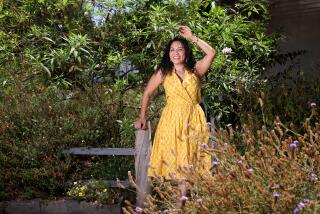For backyard-farmer companies, business is bountiful
Ignoring his aching back, Todd Lininger squatted down on his knees and inched his way around the vegetable field.
The yields were up on three arugula plants. A snail crawled in the row of lettuce. And it looked like the onions might be ready for that night’s dinner.
All in all, not a bad harvest — considering that these crops were growing in a Lilliputian backyard plot in a Claremont cul-de-sac.
Lininger calls himself a farmer, though he doesn’t ride a John Deere and never sees a sun set over the fields. Instead, he tends a succession of peewee suburban plots as if they were the sprawling ranches of the Central Valley.
“The sign of success used to be who had the best lawn,” said Lininger, 41, as he pinched the dead leaves off the plot’s lone beet. “Now, it’s all about how much food you can grow.”
Homeowners who want fresh cucumbers and heirloom tomatoes but don’t have time to grow their own hire Lininger’s company, Farmscape, to do the work for them. But don’t call him a gardener: It’s more like farming by the foot. And the 6-foot-4 ex-Marine, skinny as a snap bean, says he can barely keep up with demand.
There’s a mini-boom in such mini farms. Scores of businesses like Farmscape are sprouting up nationwide, from My Backyard Farm in San Clemente to Your Backyard Farmer in Portland, Ore., and Freelance Farmers in New Haven, Conn.
Many of these small businesses have emerged because of the country’s sluggish economy, as people who hunt for work are marketing themselves as urban farmers and catering to a clientele hungry for a cornucopia without the sweat.
Some of these microfarmers were landscapers looking to expand, said Lisa Munniksma, managing editor of Urban Farm magazine. Others were fledgling entrepreneurs seeking a niche in the green economy.
On average, the companies charge between $900 and $2,000 to have a section of land dug up — or to build a raised bed — that’s big enough to grow enough edible plants to feed a family of four.
The companies also offer personalized planting and harvesting services. For an additional weekly fee of $20 or more, a staff member will put in the plants, pluck the weeds, amend the soil, quash the bugs and fill a basket with ripened produce.
Yet the price tag hasn’t cooled consumer appetites.
Batya Kagan, who launched Your Backyard Bounty about a year ago, has found herself spending as much time nurturing customers’ squash and radicchio as she does at her own modest vegetable farm in Santa Cruz County.
The two-person staff at Your Backyard Farmer is so overwhelmed with maintaining their 67 mini-fields, they’re turning people away. Co-founder Donna Smith started a waiting list earlier this month for those willing to spend at least $1,675 a year to turn 400 square feet into rows of butternut squash, bok choy or kale.
So far, 15 people have clamored to get on the list.
Kae Yates, 65, said Lininger’s fee to plant four garden plots at her Claremont home — $2,400 — was well worth it.
“I don’t have the time or the physical ability to do this myself,” she said. “They do all the labor and I get to reap all the rewards.”
Along with fresh produce, those rewards can include the bragging rights that come with having the latest eco-conscious status symbol: a farmer to call your own.
“The reality is, in most cases, you can go to Safeway or Whole Foods and buy organic produce for less,” said Jeremy Oldfield, 27, co-founder of Freelance Farmers. “So we focus on the intangibles of this: the joy of picking a tomato in the afternoon that’s still warm from the sun, or having a dinner party and being able to point out to your guests that most of the meal came out of your backyard.”
Interest in backyard produce blossomed along with the recession, which spurred many people to try their hand at planting vegetables.
Home Depot saw its vegetable seed sales jump 30% last year and continued to have double-digit growth in January. George Ball, chief executive of W. Atlee Burpee & Co., North America’s largest home garden company, said that for the last few years the company has been selling more vegetable seeds and plants than flowers — for the first time in its 130-year history.
But rookie mistakes leave some people wanting to hand off their trowels.
Sian Seligman, the daughter of a landscape architect, grew up surrounded by gardening supplies and horticulture. The 35-year-old figured she’d be a natural with plants.
She was wrong. Her sprouts died. Too much fertilizer burned some of the herbs. Her carrots came out stubby and misshapen because the bedrock beneath her Eagle Rock home sat just a few inches below the soil surface.
When health issues this spring restricted her ability to lift heavy objects, Seligman and her husband sought help from Farmscape.
The company was formed in 2008. At the time, Lininger was working on a master’s degree in environmental sustainability at Cal Poly Pomona and volunteering with a local community organization that helped people replace their lawns with edible gardens. Neighbors and friends routinely peppered him with pleas for help on their gardens.
Sensing an opportunity, Lininger went to the city of Claremont to apply for a license to start an urban farming business.
He ran into a trio of twentysomethings, all friends from school, who had relocated to California with dreams of starting up an environmental business. A college pal who ran a small hedge fund gave them $10,000 in seed money.
The four joined forces and started wooing customers. Their first client: a cancer patient who wanted to control what she ate while undergoing chemotherapy.
“I took a pay cut from serving food at a restaurant to do this,” said Jesse Dubois, 25, one of the founders. “Every time a car broke down, we coped and carpooled.”
Word of their work spread at farmers markets, where Farmscape customers raved about the ruby hue of their watermelons, the lush tartness of their rhubarb and the peppery bite of their arugula. Soon, they gained a strong following.
Today the company has offices in Claremont, Pasadena and Los Angeles’ Westside, and has expanded its staff to eight. Revenue is small but growing: Farmscape pulled in about $54,000 for the first four months of this year — $22,000 more than last year.
Most of the money is being plowed back into Farmscape, Dubois said, to expand the network of 60 mini-farms they’ve built in Southern California.
One of them sits outside the Seligmans’ front door. Last month, Sian and her husband ordered a 4-foot-by-8-foot raised bed. The bill: About $900.
“Compared to how much we spend at the grocery store and farmers markets on produce, it’s not that bad,” Seligman reasoned.
Still, she’s not telling her mom.
“I don’t think she’d understand,” she said.
More to Read
Inside the business of entertainment
The Wide Shot brings you news, analysis and insights on everything from streaming wars to production — and what it all means for the future.
You may occasionally receive promotional content from the Los Angeles Times.










